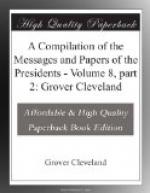These people are becoming very sensible of the baneful effects produced on their morals, their health, and existence by the abuse of ardent spirits, and some of them earnestly desire a prohibition of that article from being carried among them. The Legislature will consider whether the effectuating that desire would not be in the spirit of benevolence and liberality which they have hitherto practiced toward these our neighbors, and which has had so happy an effect toward conciliating their friendship. It has been found, too, in experience that the same abuse gives frequent rise to incidents tending much to commit our peace with the Indians.
It is now become necessary to run and mark the boundaries between them and us in various parts. The law last mentioned has authorized this to be done, but no existing appropriation meets the expense.
Certain papers explanatory of the grounds of this communication are herewith inclosed.
TH. JEFFERSON.
FEBRUARY 2, 1802.
Gentlemen of the Senate and of the House of Representatives:
I now lay before you—
1. A return of ordnance, arms, and military stores the property of the United States.
2. Returns of muskets and bayonets fabricated at the armories of the United States at Springfield and Harpers Ferry, and of the expenditures at those places; and
3. An estimate of expenditures which may be necessary for fortifications and barracks for the present year.
Besides the permanent magazines established at Springfield, West Point, and Harpers Ferry, it is thought one should be established in some point convenient for the States of North Carolina, South Carolina, and Georgia. Such a point will probably be found near the border of the Carolinas, and some small provision by the Legislature preparatory to the establishment will be necessary for the present year.
We find the United States in possession of certain iron mines and works in the county of Berkeley and State of Virginia, purchased, as is presumable, on the idea of establishing works for the fabrication of cannon and other military articles by the public. Whether this method of supplying what may be wanted will be most advisable or that of purchasing at market where competition brings everything to its proper level of price and quality is for the Legislature to decide, and if the latter alternative be preferred, it will rest for their further consideration in what way the subjects of this purchase may be best employed or disposed of. The Attorney-General’s opinion on the subject of the title accompanies this.
There are in various parts of the United States small parcels of land which have been purchased at different times for cantonments and other military purposes. Several of them are in situations not likely to be accommodated to future purposes. The loss of the records prevents a detailed statement of these until they can be supplied by inquiry. In the meantime, one of them, containing 88 acres, in the county of Essex, in New Jersey, purchased in 1799 and sold the following year to Cornelius Vermule and Andrew Codmas, though its price has been received, can not be conveyed without authority from the Legislature.




